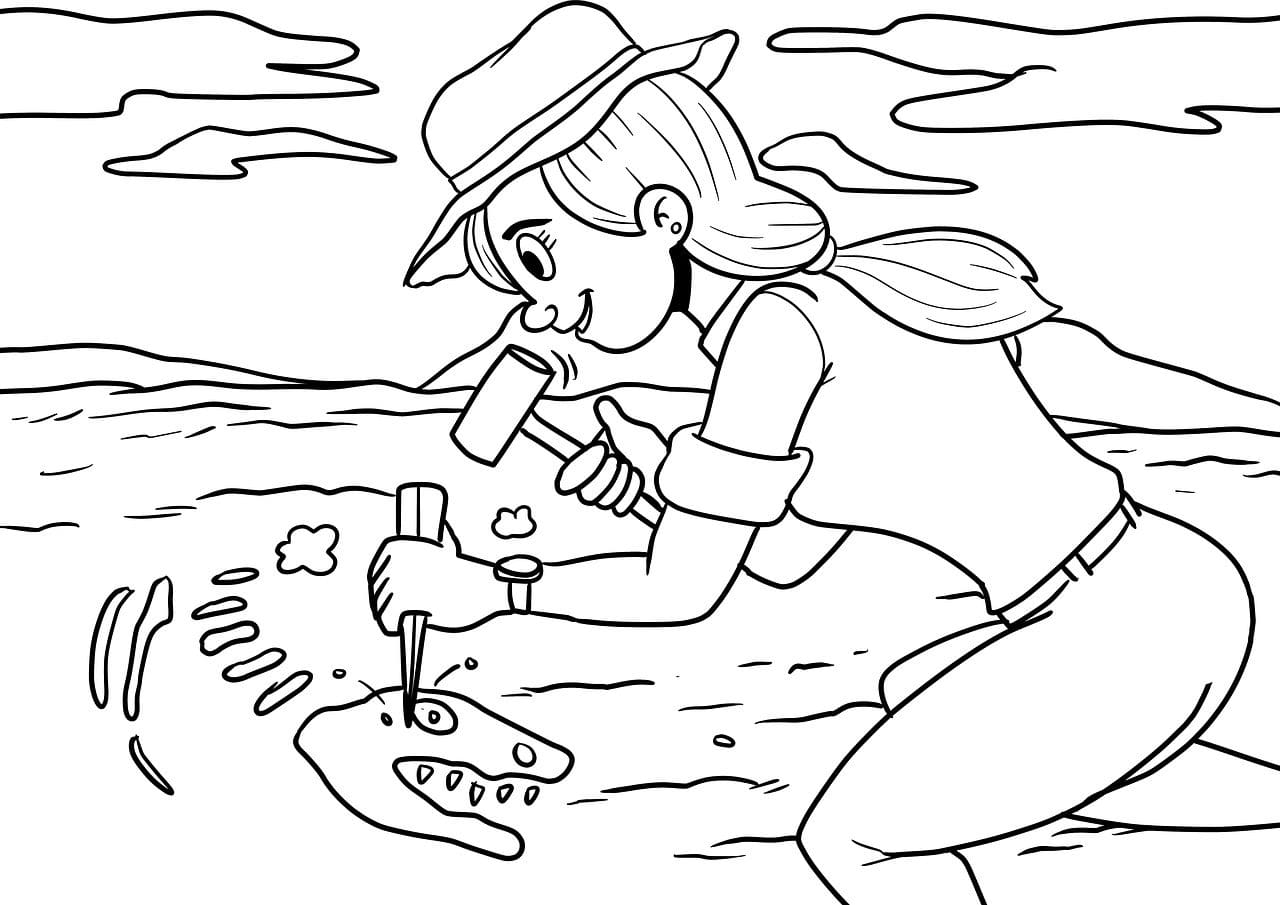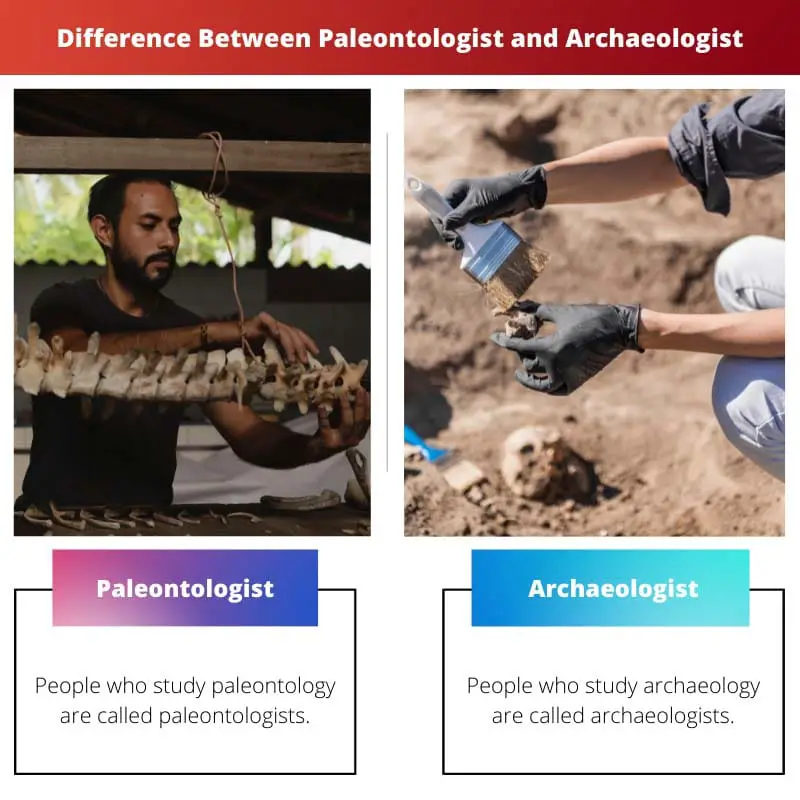A palaeontologist and an archaeologist, each of two deal with the past and history. A palaeontologist studies the fossils of animals and plants, whereas an archaeologist studies the human behaviour and culture of a particular place at a particular time.
Key Takeaways
- Palaeontologists study the fossils and remains of ancient organisms, such as dinosaurs and prehistoric plants, to understand their biology, evolution, and environmental interactions.
- Archaeologists are scientists who study human history and culture by examining artifacts, structures, and other physical evidence from past civilizations.
- While palaeontologists and archaeologists study the past, they have different focus areas and use different methods to gather and interpret data.
Paleontologist vs Archaeologist
Palaeontologists study fossils and the history of life on Earth. They examine the remains of plants and animals that lived millions of years ago. Archaeologists study human history and culture. They investigate human behaviour and the artefacts and structures left behind by ancient civilizations.

A palaeontologist’s field of study is palaeontology. Palaeontology is the study of life that once existed on Earth. This study is done by examining and researching fossils.
The work of a palaeontologist is to analyze the fossils and evaluate the existing theories or explore new theories.
An archaeologist is a person who studies the history of human culture and the lifestyle of a place through its artefacts, heritage sites, and other remaining materials.
The work of an archaeologist is to study and examine different historical objects, heritage buildings, and monuments in detail to assess the past and its history.
Comparison Table
| Parameters of Comparison | Paleontologist | Archaeologist |
|---|---|---|
| Definition | People who study paleontology are called paleontologists. | People who study archaeology are called archaeologists. |
| Field of study | Paleontologists study the history of lives that existed on earth. | Archaeologists study past human lifestyles and cultures. |
| Items of study | Paleontologists study fossils. | Archaeologists study artifacts. |
| Knowledge | A paleontologist requires to have knowledge about natural sciences, particularly in biology and geology. | An archaeologist requires to have knowledge in archaeology, anthropology, and ancient history. |
| Role | A paleontologist’s role is to study the history of animals and plants. | An archaeologist’s role is to study the history of humans. |
What is Paleontologist?
A palaeontologist studies and researches palaeontology. Palaeontology is the study of the lives that existed once upon a time on the earth.
A palaeontologist studies the fossils and finds evidence and information about the structure of that particular animal or plant. Palaeontology has many branches that focus on different aspects of different lives.
Geology and biology are part of this study. The shape and structure of fossils notify us of the biology of a particular animal or plant and also give us information on their evolution.
Palaeontology is a great source to know the history of beings. It unveils the biological truths of the lives that prevailed on Earth at some point.
A palaeontologist attempts to understand organisms of life that no longer exist. Palaeontology plays a vital role in confirming the theory of evolution.
English geologist William Smith and French zoologist Georges Cuvier discovered the significance of fossils and indicated that they could be used as an aspect to derive information.
A palaeontologist requires to have knowledge in various subjects like biology, geology, archaeology, chemistry, and anthropology.
A palaeontologist does fieldwork to search for fossils, rocks, and bones and then preserves them to examine and evaluate. A palaeontologist can work at a university or museum as well.

What is Archaeologist?
An archaeologist studies archaeology. It is a scientific study, and it is one branch of anthropology. Archaeology emphasizes humans only and concentrates on human culture and the lifestyle of the past.
Their materials for studies are different artefacts and the remaining various architectural monuments. An archaeologist inspects and assesses these materials and gives information on different cultures of history.
An archaeologist requires to have knowledge of anthropology, ancient history, ethnology, linguistics, physics, and sociology. It is a popular field of study.
An archaeologist studies different materials like weapons, jewellery, coins, writings, various tools, etc. They examine objects and come to conclusions about a particular civilization of a particular time.
It gives information about different cultures and lifestyles of the people belonging to that culture.
Archaeologists can give information about the society and its economy. Also, they provide knowledge of a civilisation’s religion and culture, which enriches our present culture—the documents and artefacts from the past stand as evidence for archaeologists’ theories.

Main Differences Between Paleontologist and Archaeologist
- A palaeontologist is a person who studies palaeontology. In contrast, an archaeologist studies the subject of archaeology.
- Palaeontology as a subject studies the history of lives that existed on Earth. On the other hand, archaeology as a subject studies different cultures of a place and the lifestyles of humans.
- A palaeontologist studies animals and plants of the earth, and on the contrary, an archaeologist studies the history of humans and their lifestyles.
- A palaeontologist observes and analyses fossils to study the lives of animals and plants. While on the other hand, to study the culture and lifestyle of humans, an archaeologist examines and contemplates different artefacts of different places and different times.
- A palaeontologist should have deep knowledge of natural sciences, such as biology and geology, as these sciences inform a lot about animals and plants. While to be a successful archaeologist, one needs to have a profound understanding of subjects like archaeology, anthropology, and ancient history.

- https://pubs.acs.org/doi/full/10.1021/acs.chemrev.5b00037
- https://link.springer.com/content/pdf/10.1007/978-3-319-57466-0.pdf

The clear distinction between the two disciplines brings clarity to their fields of study and methods. This explanation offers a comprehensive comparison, especially for those unfamiliar with the topics.
This serves as a great starting point for anyone looking to delve into the world of paleontology and archaeology. Excellent breakdown!
I agree. Both disciplines play a crucial role in understanding our world’s history and offer valuable insights into different aspects of our past.
The detailed explanations of paleontology and archaeology demonstrate the complexity and importance of these fields in our understanding of the past. The clear distinctions presented here are beneficial for aspiring researchers and enthusiasts.
Absolutely, Ryan. As an aspiring researcher myself, this comparison expertly delineates the scope and significance of paleontology and archaeology, offering a comprehensive introduction to these scientific areas.
The insights into the historical significance of paleontology and archaeology are invaluable. The detailed comparison table effectively illustrates the diverse areas of study and expertise within these scientific disciplines.
The comprehensive details and comparisons provided in this article illuminate the distinctive contributions of paleontologists and archaeologists. This piece serves as a valuable resource for those passionate about the study of Earth’s history.
Indeed, Isaac. The thorough examination of these fields enhances our understanding of the methodologies and contributions of paleontologists and archaeologists, shedding light on the rich history of life on Earth.
The descriptions of paleontology and archaeology are enlightening and offer a profound insight into the historical and cultural significance of these fields. This detailed comparison broadens our understanding of these scientific disciplines.
Absolutely, Mike. The depth of knowledge and research expertise demonstrated by paleontologists and archaeologists is both fascinating and crucial to our understanding of Earth’s history.
This in-depth comparison effectively underscores the distinctive roles and areas of study within paleontology and archaeology, providing a comprehensive overview of the significant contributions made by these scientific disciplines.
The in-depth discussion of paleontology and archaeology effectively highlights the distinct contributions of each field to our understanding of the past. This article provides invaluable insights into these scientific areas.
Absolutely, Bethany. The comparison equips readers with a deeper knowledge of these fields and encourages a greater appreciation for the scientific discoveries made by paleontologists and archaeologists.
The examination of the roles and responsibilities of paleontologists and archaeologists reveals the depth of knowledge and expertise required in each field. This comparison enhances our understanding and appreciation of these scientific endeavors.
The explanations on the roles, knowledge, and items of study for paleontologists and archaeologists provide a comprehensive understanding of the unique aspects of each field. This information enhances the appreciation for these scientific disciplines.
The focus on knowledge and materials of study serves as an enlightening exploration of the foundations of paleontology and archaeology. The distinctions are well-articulated and engaging.
I couldn’t agree more. The detailed descriptions and comparisons are highly informative and showcase the depth of expertise in both paleontology and archaeology.
I appreciate the breakdown of the roles and responsibilities of both paleontologists and archaeologists. It’s essential to understand the unique contributions each discipline makes to our understanding of Earth’s history.
The comparison table offers a useful way to highlight the key differences between these fields. It’s fascinating to explore the diverse areas of expertise within each discipline.
Absolutely. This information provides valuable insight into the significant efforts of paleontologists and archaeologists in preserving and uncovering history.
The detailed analysis of paleontology and archaeology effectively conveys the profound impact of these scientific disciplines on our understanding of the world’s history. The comprehensive comparison offers invaluable insights into the work of both paleontologists and archaeologists.
I couldn’t agree more, Dennis. This comparison is an excellent resource for those interested in pursuing research in these fields and provides a rich understanding of the foundational knowledge and expertise required for such endeavors.
The detailed exploration of paleontology and archaeology sheds light on the unique contributions of these fields, enriching our understanding of Earth’s history. This comprehensive comparison serves as an exceptional guide for aspiring researchers.
This article offers a well-organized and detailed comparison of paleontology and archaeology, providing a deeper understanding of how these scientific disciplines contribute to our knowledge of the past.
The clear differentiation of the roles, knowledge, and focus areas of both fields is commendable. This comparison effectively communicates the distinct expertise offered by paleontologists and archaeologists.
Well said, Ethan. The exploration of the work and significance of both paleontologists and archaeologists is comprehensive and enlightening, contributing to a more profound comprehension of their roles.